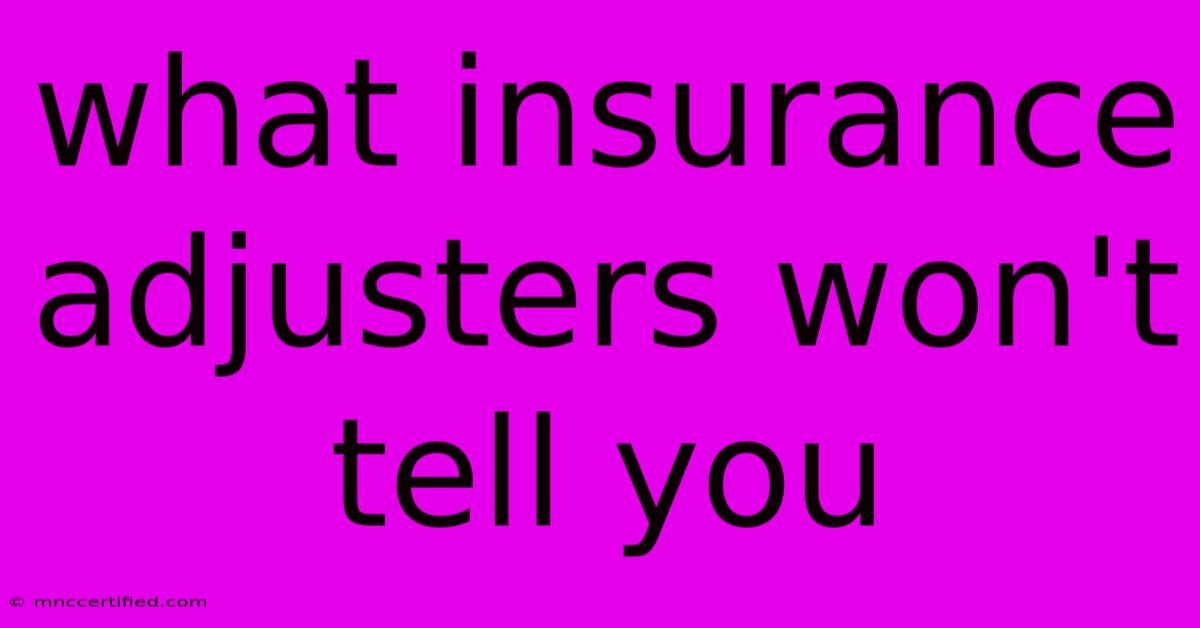What Insurance Adjusters Won't Tell You

Table of Contents
What Insurance Adjusters Won't Tell You: Insider Secrets for Navigating Your Claim
Navigating an insurance claim can feel overwhelming, especially when you're dealing with the stress of damage or loss. While insurance adjusters are supposed to help, they're ultimately working for the insurance company, not you. This means they might not always be upfront about everything, leaving you with a sense of confusion and frustration.
This article aims to shed light on some unspoken truths about insurance adjusters, giving you the knowledge to advocate for yourself and get the fair settlement you deserve.
1. They're Not Your Friend: Understanding Their Role
Remember, insurance adjusters are trained to assess claims and minimize payouts for the insurance company. While they may seem friendly and helpful, their primary objective is to protect their employer's financial interests. This can lead to situations where they might:
- Downplay the severity of your damage: They may try to convince you that the damage is less significant than it truly is, hoping you'll accept a lower settlement.
- Offer a lowball settlement: They might present a settlement amount that seems reasonable at first glance, but it may not cover all your losses.
- Delay the claim process: They may use tactics like requesting additional documentation or scheduling multiple inspections to prolong the process, hoping you'll become frustrated and accept a lower offer.
2. The Importance of Documentation: Building Your Case
Before even contacting your insurance company, start gathering documentation to strengthen your claim:
- Photos and videos: Document every aspect of the damage, taking clear and detailed pictures and videos. This visual evidence will prove invaluable during negotiations.
- Receipts and invoices: Collect receipts for any repairs or replacements related to the claim. These documents will help support your claims for reimbursement.
- Witness statements: If applicable, get written statements from any witnesses to the incident, especially if they can corroborate your version of events.
3. Don't Sign Anything Without Careful Consideration
Insurance adjusters often try to get you to sign documents quickly, potentially leading to a settlement that's not in your best interest. Before signing any papers, always:
- Read the document carefully: Understand what you're agreeing to before signing, even if it seems like a simple form.
- Ask questions: Don't be afraid to ask questions about anything you don't understand.
- Don't feel pressured: Take your time to consider the offer and don't be rushed into signing anything you're unsure about.
4. Know Your Rights: The Power of Information
Being informed about your rights is crucial. Familiarize yourself with:
- Your insurance policy: Understand the terms and conditions of your policy, particularly the coverage limits and exclusions.
- State insurance regulations: Research the insurance regulations in your state to understand your rights as a policyholder.
5. Consider an Independent Adjuster: Leveling the Playing Field
If you feel like the insurance adjuster isn't acting in your best interest, consider hiring an independent adjuster. They work for you, not the insurance company, and can help you navigate the complex claims process, negotiate a fair settlement, and protect your rights.
6. Don't Give Up: Persistence Pays Off
Dealing with insurance claims can be frustrating, but don't give up. Remain persistent and communicate effectively with your insurance company. If you believe you haven't received a fair settlement, appeal the decision or consider seeking legal advice.
Final Thoughts: Taking Control of Your Claim
Remember, you're not powerless when dealing with insurance adjusters. By being informed, organized, and assertive, you can navigate the claims process with confidence and increase your chances of receiving a fair and just settlement.

Thank you for visiting our website wich cover about What Insurance Adjusters Won't Tell You. We hope the information provided has been useful to you. Feel free to contact us if you have any questions or need further assistance. See you next time and dont miss to bookmark.
Featured Posts
-
Susie Wiles Key Figure In Trumps Win
Nov 08, 2024
-
Halle Bailey Reacts To Ddg Son Livestream
Nov 08, 2024
-
How To Get A Surety Bond In Mississippi
Nov 08, 2024
-
How To Get Purewick Covered By Insurance
Nov 08, 2024
-
Man United Wins Europa League Match Against Paok
Nov 08, 2024